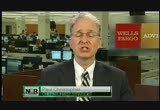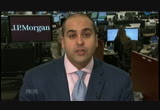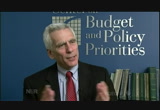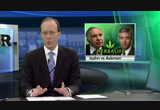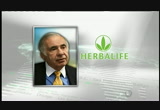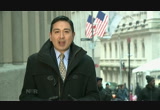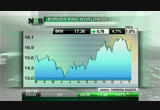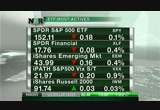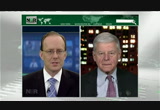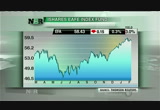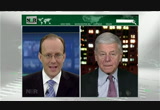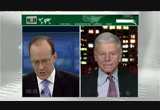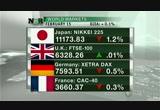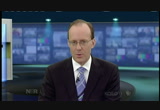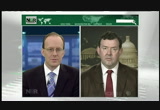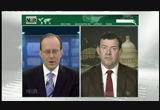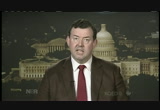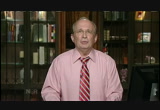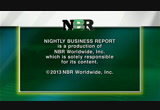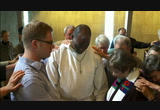tv Nightly Business Report PBS February 16, 2013 1:00am-1:30am PST
1:00 am
>> international investing has had a bad reputation over the last couple of years had a bad experience, people have taken money out of international markets. and what i think we're seeing now is some of that money starting to come back in. we're starting from a low base and it's a good sign that confidence is starting to return. >> reporter: sure, the u.s. economy may be outperforming most other developed nations. but some investment strategists see good opportunities in the weakest parts the world like europe. >> although growth is still negative, we do believe that this year will be that tipping point where growth returns positive. and things are getting progressively just a little less bad. >> reporter: he recommends buying the stocks of big european companies that get much of their revenues outside the region. >> you've got a lot of companies based in these countries which sell to the emerging markets and that growing consumer within the emerging markets. i think you're seeing a lot of >> reporter: but others have a country specific approach. wells fargo advisors has norway as a top pick.
1:01 am
>> not only is it a country with relatively low debt and a good credit standing, but it's also a country that's the 15th largest oil exporter in the world. and we think oil prices will continue to edge higher here. >> reporter: but, remember, even if you just buy stocks of big american companies, you likely have significant international exposure. intel, mcdonald's, merck, caterpillar, exxon-mobil and i.b.m. all get at least half their revenues outside the u.s. figuring out the international exposure of your potfolio may not be as simple as it once was. but it's still important. foreign stocks typically don't move in lock-step with u.s. stocks. and that can help reduce the risk in your portfolio, if the u.s. market turns south. erika miller, "n.b.r.," new york. >> tom: we'll have more on emerging markets in just a bit with market monitor guest marshall front of money manager front barnett and associates.
1:02 am
stocks struggled to gain ground again today, as we learned the nation's manufacturers tapped the brakes in january. production slowed from november and december's robust pace with factory output falling 0.4% last month. on wall street, the dow rose eight points, the nasdaq fell six, the s&p down 1.5 points. the major averages were basically flat on the week. the dow and nasdaq down less than 0.1% the s&p 500 up 0.1%. in washington, this week's theme was the middle class. president obama underlined that in his state of the union address as did republicans in their response. there is wide-spread agreement america needs to do more to ease the anxieties of middle class families. but as darren gersh reports, solutions that help workers climb into the middle class and stay there are easy to talk about, but hard to implement. >> reporter: it may not solve
1:03 am
all the problems, but a rapidly growing economy is a good place to start when it comes to creating middle class jobs. a tight labor market makes it possible for workers to demand raises and better benefits. which is why former obama adviser jared bernstein thinks economic austerity is the wrong medicine to take right now. >> you have public governments across europe and the united states sort of pulling out their fiscal supports too soon and that's hurting the middle class. >> reporter: of course conservatives consider bloated public spending a burden that threatens long-run economic growth which would hurt the middle class. and that's part of the problem, there are sharp differences over the best way to generate middle class jobs. and there is also a cultural piece of the puzzle. tucked away in our collective memories is the idea that a middle class job requiring hard work and basic skills can and should support a family for life. >> we came out of world war two
1:04 am
with a very, very untouched economy and the rest of the world was in ruins literally. and we benefited enormously from that and people think back to that era and think, gee, we should be able to do that again. >> reporter: but that is less and less likely in a world where global competition and rapidly changing technology are washing away and replacing middle class work. faced with these challenges, the president offers two solutions: more training and more investment in technology to help american workers compete. and there's bipartisan support for that approach. >> going forward the question will be can we take people with average skills and give them a new technology that makes them earn a lot of money, or can we make our workers more skilled and thus allow them to earn more money. that's going to be the issue. >> reporter: the other issue is scale. the american middle class is vast and so are the challenges facing it. >> the magnitude of the problem facing the middle class-- this disconnect between economic growth and their prosperity, their opportunities is quite large relative to many of the solutions we're proposing which are on the small side.
1:05 am
so we have to ramp up the magnitude of the solutions. >> reporter: which brings us back to where we started. big solutions can be expensive. and that's not popular and may not even be possible given our deficits. darren gersh, "n.b.r.," washington. >> tom: it's a street fight, wall street style, over nutritional supplement company herbalife. two of wall street's best known hedge fund managers are on very public, but opposite sides of the trade. the war of words has meant some big swings recently in herbalife shares. ruben ramirez reports on a
1:06 am
battle that's being played out in what's typically a very secretive industry. >> reporter: hedge funds typically take big positions in companies and are very careful not to disclose what they're buying or selling. but the battle between hedge fund giants carl icahn, who now owns 13% of herbalife's shares and bill ackman who has a billion dollar short or bet that herbalife shares will fall is taking a nasty turn. >> a number of other hedge fund managers have gone public with shorts especially when they claim that something wrong is going on at a company. what's different in this case is that icahn also came out and was very vociferous and said, "oh no, this is a wonderful company and bill ackman doesn't know what he's talking about." it's very rare to see these guys go head to head in public. >> reporter: icahn's disclosure that he now owns 14 million shares came in a filing to the securities and exchange commission late yesterday. icahn said quote "herbalife has a legitimate business model, with favorable long-term
1:07 am
opportunities for growth." icahn's stake is a big bet on the future of vitamins and protein shakes. it also puts him squarely against rival bill ackman. ackman's firm has sold short about 20 million shares of the same company, criticizing herbalife's business model saying, quote, "after 18 months of due diligence, we have concluded that it is a certainty that herbalife is a pyramid scheme to the extent that mr. icahn is helping achieve this objective, we welcome his involvement." betting a stock will go down is not very popular, but ackman is sticking to his guns. just who will blink first is anybody's guess, but hedge fund watchers point out icahn's investment is his own money, while ackman's fund pershing square has investors who could force him to throw in the towel, if shares of herbalife continue to move higher. ruben ramirez, "n.b.r.," new york. >> tom: the more than 4,000 people from carnival's "triumph" cruise ship are back on land after going without power or
1:08 am
plumbing for days in the gulf of mexico. an engine-room fire on sunday knocked out power, leading to , er-flowing toilets, no air conditioning and deteriorating living conditions while the shiw was towed to mobile, alabama. allison worrell reports on how the ill-fated cruise could impact carnival's future. >> i know it was very difficult and i want to apologize again for subjecting our guests to that. >> reporter: the five days that passengers spent adrift in the gulf of mexico are described as difficult, but the world's largest cruise line is getting positive feedback for how its crew handled the situation. >> i mean it sucked, i never want go through that again, but i mean everyone one the cruise was so nice, like all the workers and stuff it made it a lot better. >> we just endured horrible experiences but the crew did everything they could possibly do or even imagined doing with smiles on their faces. >> reporter: there is a financial cost, as carnival keeps the "trimuph" in port to fix and clean it and then
1:09 am
there's the cost of compensating passengers for the problems. that includes a full refund, a voucher for another cruise, transportation expenses and an additional $500. but the bad press from the cruise isn't expected to hurt carnival's business longer term. >> i think near term there could be a phenomenon where you kind of see some weakness in pricing and bookings, but longer term, you know, the cruise industry and the cruise company should be fine. >> reporter: this man was onboard the "triumph" and says he'll cruise again soon. >> we have three more planned this year on carnival. >> reporter: while carnival shares have fallen to their lowest price since december as the "trimuph" was towed back to the u.s., the stock is up almost 20% over the past year. long term analysts expect relatively smooth sailing for carnival and the rest of the cruise industry but not everyone is so forgiving. already, one passenger is suing carnival for the, quote, "horrifying conditions onboard the ship." allison worrell, "n.b.r.," miami.
1:10 am
>> tom: the major stock indices continued trading in narrow ranges, making small moves. the s&p 500 had a choppy session, but the range was only ten points. selling around 2:00 p.m. eastern time thanks to a news report about walmart's february sales. the index finishing down a fraction. volume was 939 million shares on the big board. almost 1.9 billion on the nasdaq. today's weakness was localized in the energy sector, falling 1.1%. the financial sector fell just 0.3%. as i mentioned, this afternoon, a news report about wal-mart hit the broad market and wal-mart shares as well. an executive at the world's largest retail called february sales, quote, "a total disaster," end quote, according to bloomberg. the report said an internal email blamed the slow start to february sales on the increase in the payroll tax that took effect at the first of the year. that had the effect of cutting worker's take home pay by 2%. wal-mart shares fell 2.2%. volume tripled.
1:11 am
wal-mart does not publicly report monthly sales figures but the executive's email contends it's the worst start to a month in at least seven years. but worries over wal-mart's sales hit other retail stocks. sears holdings dropped 2.3%. target fell 1.6%. discounter dollar general was down 1.5%. a few other consumer-oriented companies were in focus. the firm behind well known fashion brands like lee jeans, vans shoes and north face jackets had improving profit margins and earnings last quarter. v.f. corporation's outlook, though, was less than expected. but that didn't spook investors today. shares were up 3.3%. four of the five business lines saw higher revenue last quarter. fast food operator burger king was up 4.7%. earnings were much stronger than anticipated thanks to lower expenses and menu items like salads and smoothies. until last june, burger king was owned by a private equity fund, the same fund partnering with warren buffett to buy heinz. energy exploration company apache continued putting pressure on the energy stock sector, after reporting
1:12 am
disappointing results for the fourth quarter in a row and a problem with an offshore well. apache fell another 4.3% on heavy volume. the stock has fallen $7.50 per the company shut in an exploratory shallow water well in the gulf of mexico after detecting an underground flow of natural gas. regulators said it appears the company acted properly. gold is at its lowest price since august tonight, after falling $26 per ounce today, down more than 1.5% settling just above $1,600 an ounce. late yesterday in a filing, billionaire hedge fund manager george soros disclosed selling about $100 million of its position in a gold exchange traded fund in the third quarter last year. four of the five most active traded exchange traded products were lower. the russell 2,000 tracking fund eeked out a small gain. and that's tonight's market focus.
1:13 am
>> tom: yes, the u.s. stock market remains near five year highs but for real growth, tonight's market monitor is going overseas. marshall front is chairman and chief investment officer at front barnett associates. marshal, also great to see you. you manage millions of dollars, most unvested in u.s. stocks. what sets global opportunities apart from those domestic opportunities? >> i think you get some different kinds of diversification from it. i think in terms of global market being segmented into emerging markets and developed
1:14 am
markets. in the emerging markes, the economies are likely to be growing at two or three time the growth arrest u.s. economy. and, hence, the opportunities this are really quite substantial, although everybody knows that these markets are quite volatile. the developed markets are more in a recovery mode. i'm thinking of europe bottoming some tomb later this year, and japan now aggressively easing with a new monetary policy under a new government likely to see a-- finally see a real acceleration of their growth. so it's some good stories out there. >> tom: you sound very optimistic when it comes to a couple of big economies there that have been down in the dumps in europe for the better part of a couple of years. and, obviously, japan has been down for the better part almost a generation now. e.f.a. is the ticker single of an exchange traded fund that follows these areas. what are your hopes for this for a longer holding prld?
1:15 am
>> well, i think that the first positive reaction here is likely to be a recovery in the market values of some of the major groups-- major investment groups in europe as people see that their recession is likely to bottom out later this year, and i think a particular attraction in europe are the european banks that are sell at steep downtowns to their-- disowntz to their book values, reminiscent of what we had here in '09 and '10. and probably see a replay there. that will provide stimulus, particularly if and when we see the economy bottoming in germany. there's no sign of it yet, none. >> tom: i suppose that's the time to take the risk, which is what you're doing on behalf of your client. what about the emerging market fund. you're looking for a bigger growth differential in the
1:16 am
emerging markets but that comes with a lot more volatility. >> a lot more volatility, but again, advertise-- many of these markets had lagged it's global marketes, for example, the china index, the fxi, which is another e.t.f., is down about .6% this year with the s & p 500 up somewhere around 6% or 7%, and the morgan stanley world index up about 5.5%. so these have lagged recently, and with the end of the chinese lunar new year, this weekend, the chinese market is going to reopen next week. and we're likely to see some reaction to the better economic statistics that have been coming out during this lunar period. >> tom: you mentioned fxi, that was one of your picks back in janet last time we had you on this program july 27, up better than 18%.
1:17 am
now performance there. in the meantime you also lukd the technology exchange traded fund, which supby about 2%. would you put any new money to work or take any money off the table with these? >> well, we are adding to the fxi, the china index. and, clearly, with the kind of growth we're likely to see tepid growth in the u.s., until some of the headwinds we face abate. technology is an area where potentially there is significant growth in excess of the g.d.p. we're going to see. we continue to own technology. >> tom: you own all four funds we mentioned tonight, marshall? >> yes, sir. >> tom: opener friday market monitor get from chicago, marshall front can front barnett associates.
1:18 am
he moved to shut down a swiss train trading account it accused trading ahead of that deal. the agency froze the account saying it. ed call options on hynes stock one day before the deal was amount making a potential $1.7 million in profit after the deal was made probable. public. two weeks from today is when billions of dollars of government spending cuts are set to go into affect. this is the spending part of the fiscal cliff. meantime, congress continues talking about the tax part of the fiscal cliff. this week, a house committee considered limits on tax deductions from charitable donations. american tax paypayers are estimated to have claimed $185
1:19 am
billion in charitable deductions last year. that's the most since before the great recession. there is no complete data for 2011 from the i.r.s. that money represents potentially billions of tax dollars if charitable deductions were limited or eliminated. andrew watt is the president and c.e.o. of the association of fundraising professionals. andrew you testified to that house committee. there already are limits to deducting charitable donations, correct? >> absolutely. >> tom: those limits are set by a percentage of taxable income. is there a better way to do it? >> no i think that's a pretty simple way of doing it and one most people understand. >> tom: it certainly has been the rule for the better part of a couple of generations for american taxpayers. but it begs the question should the government subsidize charitable donations? >> you know, i think what this represents is a vote of confidence, if you like, from people through their elected representatives in the work nonprofit organizations do.
1:20 am
it's an extraordinary example of the way in which americans come together in communities to deliver solutions to problems that government can't or doesn't have the skills to fix. . >> tom: but why would that then beg essentially for a government subsidy through a tax deduction? >> government is already investing billions of dollars every year in social causes, in programs ranging from adult literacy to hiv-aids. the reason they make an investment with nonprofits i think is nonprofits are often closer to the ground, they're built into the communities. they understand the issues as they arise. and i think that nonprofits are often much better able than government, which is inherently inflexible, to deliver solutions in a cost-effective way and in a timely fashion. it's a good investment. >> tom: there's a lot of debate that's going to be going on about tax deductibility and mortgage interest tax deductibility is one of those that is going to come under consideration. critics will say it's higher
1:21 am
income earners that will benefit the most. that's certainly the cass for charitable donations. taxable incomes up to 50,000 donate approximately 6%. how do you try to spread this out? >> let's look at two things. for every dollar of tax revenue forgone, you get a $3 value through nonprofit activity. that's a pretty good rate of return, i'd say. the second thing is let's not look at this as a tax deduction. whether you give, i giving or anyone else gives, it costs us money. it's a choice, and it's a choice we don't benefit from. i don't look at it when i choose to give each year as a deduction. i sit down with my wife and decide how much money we can afford to invest in community action. and we think how much more can the charity get with the tax deduction added in. it's about extending the value what i am already giving away.
1:22 am
>> tom: a three to one return on investment is the statistic you got, right? >> that's a statistic that comes out of giving u.s.a. i think that's a pretty good rate of return. and if any stock i invested in showed that, i would be a pretty happy guy. >> tom: good point. we have to leave it there. add waw who heads up the associate of fund-raising professionals. >> thanks. >> tom: monday, with the markets closed for presidents' day, we dive deeper into giving social investing and corporate citizenship. it's conscious capital, an "n.b.r." special edition.. you can read more about charitable giving and corporate responsibility on n.b.r.-u. just head to www.nbr.com and look for the "nbr-u" tab. there you'll find tips from harvard business school for creating an effective corporate social responsibility strategy. finally tonight, better than expected. it's a phrase we use a lot when it comes to quarterly earnings season. but this week's lou's been thinking about being better than
1:23 am
expected, beyond the bottom line. here's author and educator lou heckler. >> i have lived in florida for more than 30 years and, naturally, have enjoyed the disney parks in orlando more than a few times. i've also played a little game when i speak about customer service, asking audiences if a they have been to one of the disney parks, what is the first word that comes to their minds? the winner is not fun or fantasy it's clean. somehow, they manage to keep their 30,000-plus acres remarkably clean. makes you wonder why the owner but, disney is so much more than clean. it's really about brute force attention to details and consistency of service. my wife and i recently met a friend vacationing there. we all went to lunch at a lovely italian restaurant in downtown disney. after the waiter greeted us, the very first thing he asked was: "does anyone have any food allergies i should know about?" we will happily accommodate that. it turns out i do: i can't eat any seafood or dairy products. the waiter recommended several items he thought i might like. then sous chef even came to our table and talked very specifically with me about how she could see that i got a terrific lunch without any allergy problems.
1:24 am
what are you known for? with some brute force attention to details, you might create a whole new perception in your customers minds. i'm lou heckler. >> tom: that's "nightly business report" for friday, february 15. have a great weekend, everyone. we'll see you online at www.nbr.com and back here monday night. captioning sponsored by wpbt captioned by media access group at wgbh access.wgbh.org
1:28 am
program is provided by the gruber family foundation and by the members of kqed. ♪ as an openly gay man, it causes a significant amount of personal pain for me, when the church that i love says that homosexuality is incompatible with christian teaching. it's just fundamentally unfair and untrue. >> we wonder why these people keep banging on the doors, keep pushing us and pushing us, trying to back us into a corner. ♪
1:29 am
>> i think every time we go, we hope that this will be the year. you wanna believe that people will do the right thing. you wanna believe that of course the church will step up. >> san francisco pastor karen oliveto, berkeley divinity professor randall miller and bakersfield pastor richard thompson are heading toward a showdown. at a convention in tampa, florida, they'll join other united methodists from around the world to debate whether their church should continue viewing homosexuality as a sin. >> it's been said that politics and religion should never be discussed in polite conversation. but the united methodist church is doing just that -- discussing whether to change church doctrine added in 1972 that declares homosexuality incompatible with christianity.
136 Views
IN COLLECTIONS
KQED (PBS) Television Archive
Television Archive  Television Archive News Search Service
Television Archive News Search Service 
Uploaded by TV Archive on

 Live Music Archive
Live Music Archive Librivox Free Audio
Librivox Free Audio Metropolitan Museum
Metropolitan Museum Cleveland Museum of Art
Cleveland Museum of Art Internet Arcade
Internet Arcade Console Living Room
Console Living Room Books to Borrow
Books to Borrow Open Library
Open Library TV News
TV News Understanding 9/11
Understanding 9/11